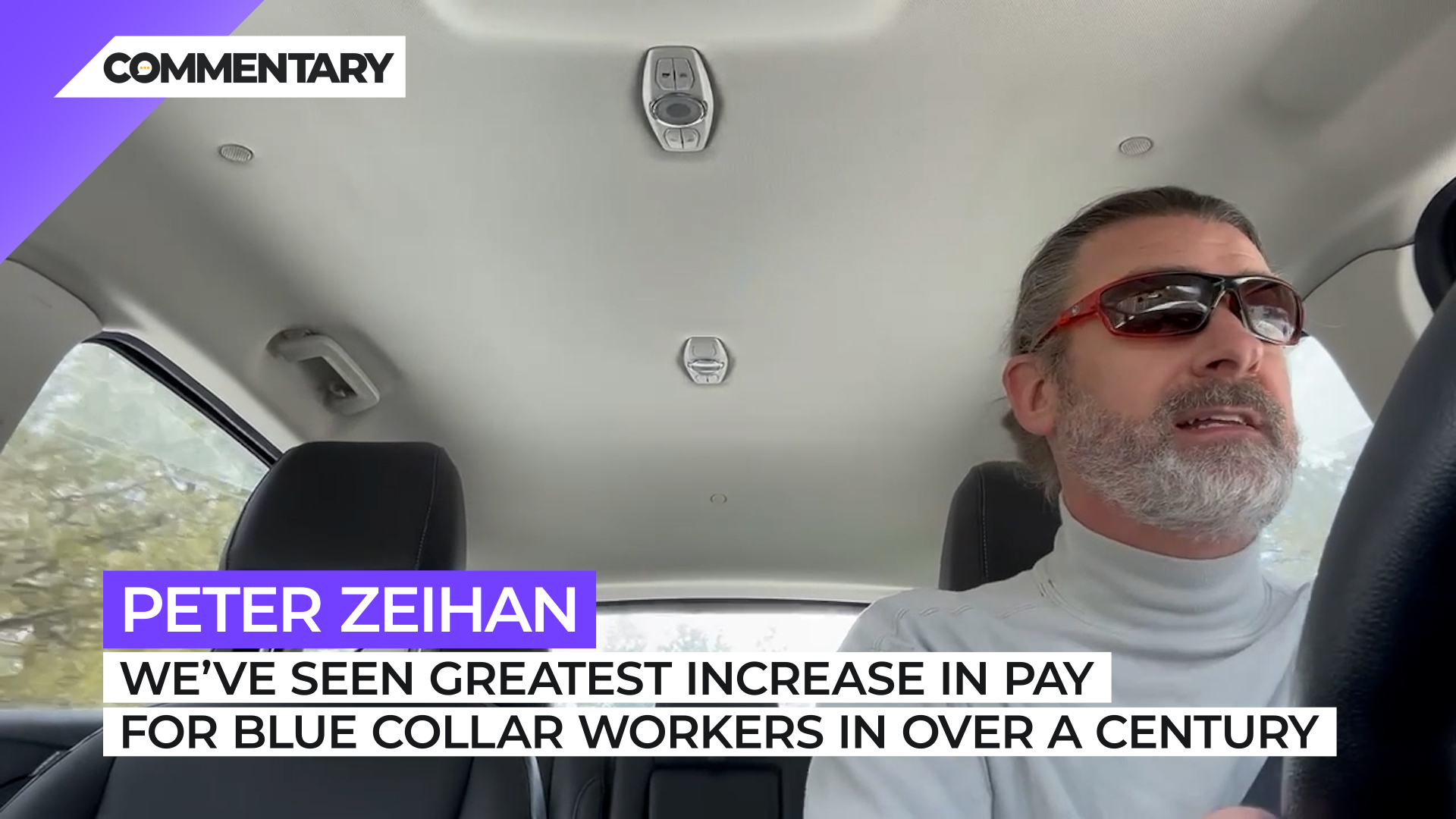
Commentary
-
Our commentary partners will help you reach your own conclusions on complex topics.
Everybody, Peter Zeihan here. We’ve had a lot of questions come in about AI and what that means for the workforce moving forward.
What sort of activities should we expect to be replaced?
What does this mean for economics and labor and politics? And are there any obvious winners either in terms of geography, or sectors? One popular one that comes in is whether or not this is going to hit red states or blue states more? For example, the cop out answer is we don’t really know yet, because we’re dealing with technologies that have yet to be invented. But there are a few general guidelines we have. First of all, it’s not so much that jobs get created or destroyed. It’s it that they change. And it’s pretty common when you’re dealing with an environment that has evolved because of technology, you know, jobs evolve to, we’ve been talking about technology, overwhelming the workforce, really, since the onset of the Industrial Revolution, and it obviously generates changes.
We don’t all live on subsistence farms anymore. The trick is whether or not the technology evolves faster than our political ability to adapt to the changing workforce conditions. And I would argue that at least at the moment, we’re nowhere near that. I mean, yes, we’re dealing with the information revolution. And yes, there is the possibility that’s going to replace a lot of jobs increased productivity to the point that a lot of people just don’t have anything to do. But we, that’s all theoretical, our experience in the last five years, if anything, it’s going to be the opposite. You see, the sort of things that it evolutions do? Is it making it it’s in the name information, information tech, it manipulates information at a faster rate. But that is not where the uneducated people in our society are.
Most of the uneducated society, people in our society are in lower class blue collar jobs. That is not something that AI can help with at all. That’s something that the advances we’ve seen in productivity are almost irrelevant. Ai instead is taking away those low to mid skilled, white collar jobs, which is not normally what we think of when we think about the sort of jobs that can be destroyed. So we’ve actually in the last three years seems the greatest increase in take home pay for low skilled blue collar workers in over a century. And that has actually helped him in case the United States and narrow economic inequality to a degree that we have not seen since before the World Wars. So if anything, the theory is proving itself wrong rather than right. However, if you’re, say, a copy editor, or a secretary, well, you might have some really big problems, because AI already has been able to deal with those jobs in a more efficient manner. And you just don’t need as many people. In fact, the blockchain which is one of the things that under mines, crypto, sorry, undergirds crypto not under mines, crypto, is something that could be very transformative and things like health care. If you think about any doctor’s office you’ve been in, there’s that huge forest of staff in the back who are basically on the phone with the insurance agents every day all day.
Well, the whole idea of blockchain is that anyone who controls half of the pieces can grant others access Well, in your healthcare records, that would be you. And if everything from that can be digitized, and that entire flood of low skilled white collar workers in the back of every doctor’s office, and hospital simply goes away. So it’s probably not going to hit where we think it is. And it’s probably not a red versus blue thing. And it’s probably not a coastal versus interior thing. It’s mid levels of education versus the edges. If you’re highly educated or low educated, you look fine from this. Second, there’s the issue of time. Now, obviously, these technologies continue moving. But there’s two reasons to expect that we’re going to have a lot more time to make this adaptation that I think a lot of people give it credit for. Number one is as the baby boomers are retiring, which is happening right now, they are liquidating all of their investments and going into really boring stuff like T bills and cash. That’s not what funds it startups.
That’s not even what funds the big IT companies in Silicon Valley. For that you need venture capital, you need a high velocity of money, retirees are no good for that. And the whole world is aging very rapidly. And Baby Boomers are not a phenomenon limited to the United States. So we’re gonna see the amount of capital just kind of seize up in the entire space. At the same time, most of the world is running out of the 20 and the 30 somethings that are necessary to do the research and develop these technologies in the first place. So overall, we should expect the pace of technological evolution of the world to slow quite a bit in the two decades, excuse me in the two decades to come compared to the two decades we’ve just completed. Second, we’re not close to a general AI breakthrough. Let me explain what I mean by that artificial intelligence kind of falls into two general buckets. general AI is, you know, Skynet, the idea that the machine can actually look at a situation think and come up with a potential solution and then act on it. Or nowhere close to that. I don’t know, anyone, even Elon Musk thinks we’re gonna be there before 2050. And this is before you consider that the amount of capital and workers that are available to develop these sorts of things is in the process of drying up.
So probably we’re looking at 2016 2070 or beyond, we’re just, we’re not even close. The other type of AI is applied AI or mission specific AI. And it’s not so much artificial intelligence in the way that we kind of have in our heads, but it is machine learning. But it’s really more like machine programming. So you put in dozens, hundreds and 1000s of if then statements into a program for it to execute. And as long as the conditions that are presented to the machine, fall within the rubric of what you programmed, you’re okay. But if you see something even a little out of context, the whole thing tends to fall apart. So an example, let’s say you’re developing an AI driving program, and you tell it what a stop sign looks like, what if the stop sign has a bumper sticker on it, or graffiti, or if it’s on the side of a building as part of an ad, applied AI can’t recognize those other conditions. And if you kind of widen your parameters to make it a rounding error, then it’s going to make a very real mistakes in the very real world that any four year old couldn’t.
So if you need AI to do calculus, yes, they’re lightyears ahead of what we as humans can do right now. If you needed to make a decision based on a judgment call, they are still completely and utterly incompetent. All right, but let’s assume let’s assume that some of this happens anyway. And so we’re going to have to deal with an AI system that is making decisions. What does that mean for the job industry. So historically speaking, this is not the first time we’ve dealt with this issue. In fact, for those of you remember your 1800s political economic theory, good old Karl Marx, his whole idea was that the future of the proletariat was to take over from the capitalists, then once the industrial plant was built, then you could get rid of the bourgeoisie and the proletariat could live and do very, very well for itself, because the machines and the industrial plant would be there to provide for everyone.
Well, folks, he was wrong, then he still wrong. Now, universal basic income is the idea that we live in such a world of plenty that we don’t need to work. But as we have seen in the last three or five years, if anything, the opposite, is true, the productivity has stalled, in part because of tech. But moreover, because we’ve discovered that as populations evolve in industrialization, we live longer, we have fewer kids. And that means after we urbanize, 5678, decades after, we’re actually running out of young people to do a lot of the lower skilled work. So if anything, Marx was completely wrong, because the part of the population that he thought that would benefit the most from industrialization is at the current moment, actually not doing a whole lot all that well, the middle class, and the lower classes that are cleaning up right now, there are very, very few places in the United States at this point.
Where if you were earning $15, an hour before COVID, you’re still in that bracket today, you’ve been able to leverage the fact that there’s a sharp labor shortage to move up. And that means you have a vested interest in the system. And it means if you decide to not work, there is no one who is willing to pay you to not work because there are jobs, jobs, jobs everywhere. So in conclusion, is AI real? Yes. But we’ve been thinking about it completely wrong. And most of the assessments that I’ve seen from almost everywhere, are drawing the wrong conclusions. When it comes to sociological outcomes. It’s going to be important. It’s going to change who we are. It’s going to change how we live and how we work. But the word here is change. It’s not a revolution. All right, that’s it for me. I’m gonna go get a snow shovel. Take care.
-
Hurricane Helene hits US coast, Appalachia and beyond
Hurricane Helene hit Florida and Georgia overnight between Sept. 26 and 27 as a Category 4 hurricane, and accompanying storms will continue reaching deeper into the continental United States today. Dangerous flash flooding from the hurricane, known as storm surge, was some of the worst flooding that the Tampa Bay area has ever seen, and… -
Israel holds upper hand against Lebanon, Hezbollah and Iran
On Wednesday, Sept. 25, Hezbollah launched a ballistic missile at Tel Aviv in retaliation for Israel’s explosive pager attack that blew up devices across Lebanon. Although Israel’s defense systems intercepted the surface-to-surface missile, the attempted strike on Tel Aviv marked a significant escalation by Hezbollah. Since the siege on Gaza began, shortly after the Oct. 7, 2023,… -
The Sinaloa Cartel civil war
Fears of a civil war within the Sinaloa Cartel are growing as violence between competing factions within the cartel continues. The Mexican Army has dispatched around 600 elite troops to Sinaloa to help quell those fears, in addition to roughly 2,200 regular soldiers and National Guard. Watch the above video as Straight Arrow News contributor… -
New Ukrainian weapons hit Russia where it hurts
Ukrainian drones struck a major Russian ammunition depot, triggering a massive explosion that was captured on camera. According to the Ukrainian military, 2,000 tons of munitions had arrived at the depot before the attack. Over the past two years, Ukraine has significantly increased its domestic drone production, allowing it to scale up attacks on military… -
Weighing social costs vs. economic benefits on immigration
Global human migration is one of the defining elements of our current historical era, according to the United Nations. Migrants face both the incentives to leave — forced out by climate change, crime and corruption, extreme poverty or violence — and incentives for where to go, based on available job opportunities and so on. Migration…
Latest Stories
-
 Getty Images
Getty Images
Greenland bans foreign political donations amid renewed US interest
-
 AP Images
AP Images
Protests against Trump and Project 2025 expected in all 50 states
-
 Getty Images
Getty Images
USPS resumes shipments from China, Hong Kong after brief suspension
-
 Getty Images
Getty Images
Sweden sees worst mass shooting in nation’s history; 11 dead
-
 Reuters
Reuters
First migrant flight lands at Guantánamo Bay
Popular Opinions
-
In addition to the facts, we believe it’s vital to hear perspectives from all sides of the political spectrum.
Latest Opinions
In addition to the facts, we believe it’s vital to hear perspectives from all sides of the political spectrum. We hope these different voices will help you reach your own conclusions.
The opinions published in this section are solely those of the contributors and do not reflect the views of Straight Arrow News.





















Latest Commentary
We know it is important to hear from a diverse range of observers on the complex topics we face and believe our commentary partners will help you reach your own conclusions.
The commentaries published in this section are solely those of the contributors and do not reflect the views of Straight Arrow News.
Dr. Frank Luntz
Pollster and Political Analyst‘A disturbing pick’: Americans debate Musk, Trump’s cabinet picks
‘Dysfunctional’: Americans share criticisms of Congress
‘Instill optimism’: Americans on how future generations can succeed